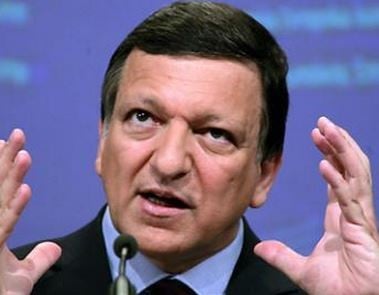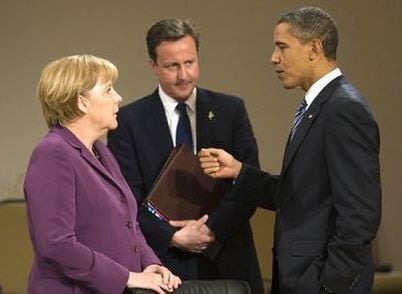Prime Minister David Cameron’s confrontational approach to Europe has undermined the UK’s standing in Europe to such an extent that it is no longer the historic first point of contact between the US and Europe, said José Manuel Barroso, the former European Commission president.
When President Barack Obama wants to approach Europe about something today, he tends to go to German Chancellor Angela Merkel, rather than the UK’s Prime Minister.
Mr. Barroso went as far as to say that Mr. Cameron has probably spoiled any future UK leader’s chances of patching things up and bringing the UK back to the heart of Europe.
The opposition Labour party has long warned that this approach is leaving the country isolated within Europe. Shadow foreign secretary Douglas Alexander accused the prime minister of “burning bridges with our EU allies when he should have been building alliances.”
Mr. Barroso criticized Mr. Cameron’s “defensive agenda” in Brussels, but also acknowledged he is under intense pressure from Conservative Eurosceptic backbenchers.
José Manuel Barroso was President of the European Commission from November 22, 2004 to 31 October 31, 2014.
In a BBC Radio 4 – World at One interview on Monday, Mr. Barroso said:
“I see David Cameron as basically a very pragmatic leader, someone that certainly wants to defend the interests of his country, as previous prime ministers have done. But while with Tony Blair Britain was really playing a very important role in the European Union, they were at the centre of decisions, today this is no longer the case.”
“I think it’s a matter for reflection: the American president, if he wants to get European countries on board, I think the first call he makes is to the chancellor of Germany, no longer to the British prime minister, and this is new.”
Mr. Cameron has pledged to hold a referendum on European Union membership in 2017 if his party wins the general elections in May 2015. His “aggressive rhetoric” as the referendum approaches is seriously undermining the UK’s standing both in Europe and abroad, Mr. Barroso warned. It could also make it extremely difficult to effectively inform the population about the benefits of the EU as the plebiscite approaches, he added.
The American President today is more likely to talk directly with the German leader regarding European matters than the British one.
Mr. Barroso said:
“I think many people that are going to make the case when the time comes, and if there is a referendum, I think the majority will be in favour, at least I hope so. But it depends now on leadership in Britain.”
“Frankly, it’s not sure because the current situation – putting all the time the blame on Europe – makes it harder. You cannot criticize Brussels and the European Union from day one to day six and to ask for people to vote for Europe (on) day seven.”
Mr. Barroso believes Mr. Cameron’s negative approach is counterproductive. He argues the British Prime Minister would be much more effective if he concentrated on a positive agenda.
If the UK focused on the European-wide concerns regarding“benefit tourism” rather than the fundamental principle of the free movement of labor, he would gather much more support and sympathy from other member states, Mr. Barroso explained.
Mr. Barroso said:
“You have heard the leaders of other countries, from Germany and others, saying clearly that to renegotiate those principles is simply not possible, but to address the issues of concern on abuse of migration, this is certainly possible, I think it would be useful to do it.”
Labour’s shadow Europe minister, Pat McFadden, said:
“The stance adopted by David Cameron, driven by weakness in the face of his Eurosceptic backbenchers, is not serving Britain’s interests well. We need a more confident approach where Britain plays a leading role in Europe.”
Cameron is “standing up for Britain”
Conservative Member of Parliament (MP) Henry Smith accused Mr. Barroso of harking back to the days when Gordon Brown and Tony Blair would roll over to his demands “time and time again.”
Mr. Smith believes Mr. Cameron is standing up for Britain’s interests in Europe and will carry on doing so, regardless of whose feathers get ruffled in Brussels. “With the fastest-growing economy in Europe, Mr Barroso should perhaps look to the UK for advice and inspiration rather than lecturing us from a sedentary position,” he added.
There is a growing feeling among Brits that the Eurozone, which is at serious risk of sliding into a deflationary spiral of falling prices and long-term recession, is falling apart.



